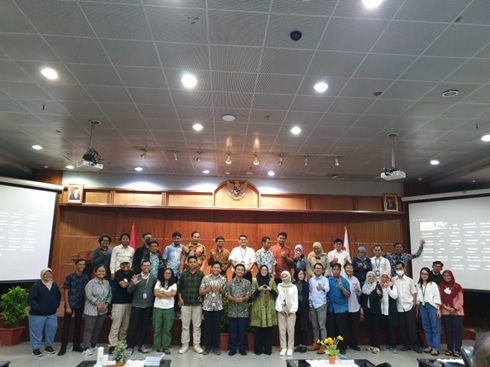huma.or.id- On Wednesday, February 21, 2024, HuMa, together with the National Research and Innovation Agency (BRIN), the National Land College (STPN) Press, and Brawijaya University, held a launch and discussion event titled “Critical Agrarian Studies Handbook” at the BRIN seminar room. The event, held in a hybrid manner, featured five speakers including Laksmi A Savitri, Lilis Mulyani, Ahmad Nashih Luthfi, Agung Wibowo, and Muntaza.
One of the speakers, who is also a co-editor of the book “Critical Agrarian Studies Handbook,” Ahmad Nashih Luthfi, stated that the book is a translation of 72 articles on critical agrarian studies into Indonesian. It involved forty contributors. “The translator contributors are individuals who care and dedicate themselves to advocating agrarian issues,” said Luthfi during a Zoom meeting on Wednesday, (21/02).

*Photo of Speakers and Participants in the Launch and Discussion of the Critical Agrarian Studies Handbook
The Critical Agrarian Studies Handbook presents various perspectives, including a gender perspective on agrarian issues. Muntaza, one of the translators of the Critical Agrarian Studies Handbook, mentioned that the gender perspective in agrarian studies can reveal how agrarian changes affect women and men differently and how gender relations play a crucial role in the functioning of agrarian systems. Muntaza also emphasized that agrarian issues are close to Indonesian society. “With this book, it is hoped to bridge the gap for the community to understand agrarian issues more easily,” expressed Muntaza on Wednesday, (21/02).
Lilis Mulyani, a researcher at BRIN who was also involved in the book’s translation, highlighted that an important aspect of agrarian studies is related to law. She mentioned that law plays a critical role in the formation of land markets where public law and land law facilitate the commodification of land through the legalization of individual rights. On the other hand, the law imposes effective restrictions on individual land ownership rights.
“Agrarian issues are important, especially to provide input to policymakers so that policies/laws are based on data, facts, and science rather than just interests,” stated Lilis during the event, (21/02).
Another translator, Agung Wibowo, the Executive Coordinator of the HuMa Indonesia Association, mentioned that at the end of the Critical Agrarian Studies Handbook, there are tasks for readers on how to address some issues in agrarian studies.
Agung also added that one of the methods used by the translator contributors in translating this book is the learning circle method. “The learning circle method is one of the methods used by the translators to produce this book, which is interesting because we translators can share and exchange ideas,” said Agung on Wednesday (21/02).
Another speaker, Laksmi Andriani Savitri, welcomed the launch of the Critical Agrarian Studies Handbook. In her presentation, she dissected the critical meaning in the book’s title. For her, citing (Borras 2023), critical agrarian studies are not determined by scholars who write about them, but are shaped by how the knowledge is practiced, understood, and experienced by the community of scholars and practitioners.
Laksmi also emphasized that the significance of critical agrarian studies lies in its practice, such as whether we can build practices informed by critical agrarian theory. Can we reflect on the decisions and actions of change that we choose? And to what extent can we learn from experience?.
“Therefore




0 Komentar
Tinggalkan Balasan